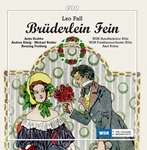|
Back
12/07/2017
Leo Fall: Brüderlein fein
Michael Roider (Josef Drechsler), Anke Krabbe (Tony), Andrea Bönig (Gertrude/older youth), Henning Freiberg (Narrator), West German Radio Chorus, Cologne, Robert Blank (Choral Director), WDR Radio Studio Orchestra of Cologne, Axel Kober (conductor)
Recording: Philharmonie, Cologne, Germany (March 12-16, 2012) – 55’40
cpo # 777 796-2 – (Distributed by Naxos of America) – Booklet in German and English

   
This diminutive 1909 Viennese singspiel came at a time when Leo Fall had already launched his highly successful Die Dollarprinzessin two years earlier; however, structurally-speaking, Brüderlein fein (translated: Fine little brother) has more similarities to his 1902 Paroli. Instead of following a Beaumarchais plot (found in Paroli), we’re channeled inside a fictional snippet-of-life of Josef Drechsler via the playwright, Ferdinand Raimund.
This is obviously a “companion piece” to Paroli since cpo chose to record both at the same time (and same venue) along with all the same artists, though the cast is reduced to only four characters. The action centers around the 40th wedding anniversary of Drechsler (Michael Roider) and wife, Tony (Anke Krabbe) by borrowing an “older” figure of Youth (Andrea Bönig) from Raimund’s Verschwender who deeds ‘one hour of their beautiful early years.’
Call it an idyllic flashback, for Henning Freiberg’s narration cleanly moves musical numbers in strophic form. Leo Fall had a gift for melodious numbers, and the duets between the two protagonists are particularly lilting and buoyant. But it’s within Andrea Bönig’s two roles which add a crystalline sheen of softness; one of these tunes turns back to the musical “Prologue.”
Even though Lehár impressions abound, Leo Fall developed his own sense of frothy conveyances. One even hears anticipations of his zany and sassy Madame Pompadour from 1922.
Rather lengthy for such a petite œuvre, the opening orchestration is sheer delight. Leo Fall grew up in a family fit for merriment; therefore, it comes as no surprise that he’d add tidbits of earlier well-known operettas and bouffes. Several hidden clauses come and go in just a handful of bars...a veritable pastiche of light fare.
Yet the most indelible piece found inside Brüderlein fein comes by way of the bonus track, Leben un lieben...grandiose, sparkling and refreshing, this concert waltz spouts off with bombastic brass reaches and magical harp glissandos which add a whip of theatrical elegance. This could rival anything penned from Johann Strauss II or even Oscar Straus.
Christie Grimstad
|